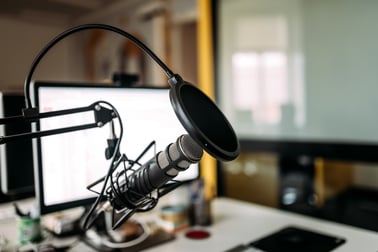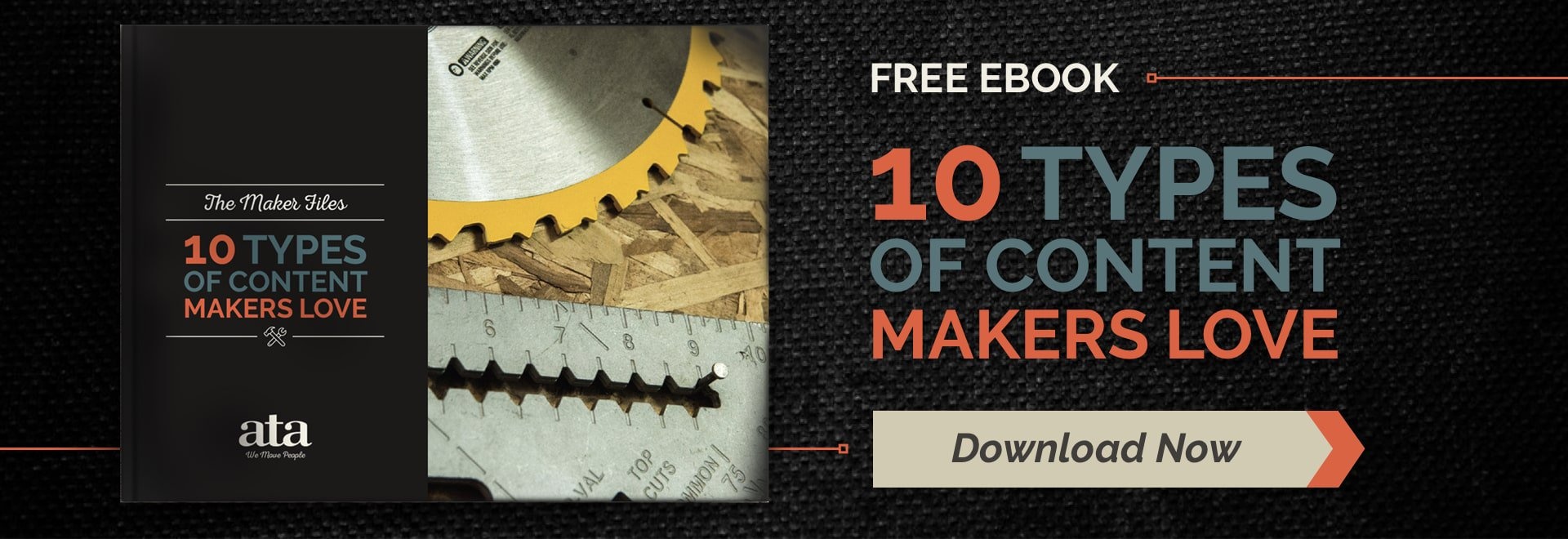 With the help of today's technology, everyone is always on the go, and the maker community is no different. What we also know is that there's so much content available online, and makers want to learn more about their craft — but with so many things competing for their time and attention, how can they consume it all? The answer is by making creative use of their downtime with podcasts.
With the help of today's technology, everyone is always on the go, and the maker community is no different. What we also know is that there's so much content available online, and makers want to learn more about their craft — but with so many things competing for their time and attention, how can they consume it all? The answer is by making creative use of their downtime with podcasts.
Makers of all kinds are listening to podcasts for education and entertainment during while commuting, cooking, and just going about their day-to-day. But why are makers crazy for podcasts, and how can your brand join the conversation? In this post, we'll explain why today's makers love podcasts and give your brand some tips for starting your own.
Why Are Podcasts So Popular?
A podcast is an episodic series of audio recordings that someone can download in order to listen to. Podcasts are most popularly available through digital audio feeds such as iTunes, Spotify, SoundCloud, and Stitcher, but they can also exist solely on a website or blog. The format of podcasts varies widely, from quick, ten-minute episodes to longer form, 60+ minute conversations; it all depends on what the creator wants to discuss and how. The majority of today's podcasts are consumed by younger audiences: 42% of people under 35 (millennials) listen to podcasts.
There are multiple reasons why podcasts have risen in popularity since they were introduced in the early 2000s (fun fact: "podcast" is a portmanteau of "iPod" and "broadcast"). Here are some of the most important reasons:
 Podcasts are mobile. As technology has evolved to become more mobile, so has the content we consume on our devices. Podcasts are a screenless form of content that makers can listen to while they're crafting, driving, or doing just about anything else. Probably the biggest factor in the popularity of podcasts is that they're digestible on the go or during downtime.
Podcasts are mobile. As technology has evolved to become more mobile, so has the content we consume on our devices. Podcasts are a screenless form of content that makers can listen to while they're crafting, driving, or doing just about anything else. Probably the biggest factor in the popularity of podcasts is that they're digestible on the go or during downtime.- Podcasts provide niche information. Most successful podcasts are created to reach a specific audience with information on a specific topic or range of topics, meaning that the content of a podcast can be carefully tailored to a specific niche of people who may be looking for it. Because podcasts are purely audio-based, that means discussions can delve into a lot of detail in a relatively short amount of time.
- Listeners form a strong community around podcast discussions. Fans of podcasts can be incredibly passionate, looking forward to each new upload the same way you might anticipate the newest season of your favorite television show. Not only is there a lot of engagement between creators and listeners on social media platforms, but listeners will often start their own conversations inspired by throughs shared on the podcast.
- They're relatively easy to produce. Podcasts require significantly less effort, equipment, and production in order to provide a quality output. This means that anyone who has an interest in a topic, expert opinions to share, or wants a creative outlet can start a podcast. While not every podcast has thousands of listeners, the low barrier to entry provides an opportunity for any person or brand to find their voice (literally).
Types of Creative Podcasts
As we've mentioned above, every podcast is different. The only limitation is that podcasts are entirely audio-based, but the content inside each podcast episode can range from interviews to music to short stories and more. Here are just a few of the most common podcast types that makers love:
 Industry news and advice: Many maker podcasts cover trending news topics that are relevant to makers or use interviews or special editorial pieces to pass on valuable advice to help makers in their process. A few examples of podcasts in this category are TGIM and Making It.
Industry news and advice: Many maker podcasts cover trending news topics that are relevant to makers or use interviews or special editorial pieces to pass on valuable advice to help makers in their process. A few examples of podcasts in this category are TGIM and Making It.- Entertainment and community: Other podcasts might take a more relaxed or even humorous approach to discussing creativity in order to simply provide a community for makers who understand and support each other. Examples of this entertaining type of podcast are Creative Pep Talk and Coffee and Conversation.
- Small business tips: Finally, one of the largest podcast types is made of shows dedicated to discussing entrepreneurship and small business tips. These podcasts are both informational and inspirational in nature, and often feature successful guests sharing their business stories. Examples of this category include NPR's How I Built This and Proof to Product.
As a side note, the podcast examples we've listed here are generally ones that deal with the maker movement as a whole, but there could be any number of podcasts focused more narrowly on one particular craft. These types of podcasts can be just as valuable to the makers they target. Before starting your own podcast, it would be a great idea to research what podcasts your target maker audiences are already listening to.
How to Create a Podcast Makers Love
Do you think your business might have the right kind of expertise to share in a podcast? It's important to remember that your podcast, just like any other content you share, should be focused on adding value to your listeners' lives, not just promoting your products. Think critically about your podcast's focus, structure, and creative needs, but once you're ready to start producing episodes, here are some tips to keep in mind:
 Get the right setup for quality. We mentioned that starting a podcast doesn't require a lot of equipment or a huge financial investment, and that's true. In most cases, you already have a device with audio editing software (like Garageband) and hosting a podcast can be free or relatively inexpensive, especially when you're first starting out. However, to ensure your podcast is of a good listening quality, you should invest in an external microphone or two, as well as a pair of headphones for each host and guest.
Get the right setup for quality. We mentioned that starting a podcast doesn't require a lot of equipment or a huge financial investment, and that's true. In most cases, you already have a device with audio editing software (like Garageband) and hosting a podcast can be free or relatively inexpensive, especially when you're first starting out. However, to ensure your podcast is of a good listening quality, you should invest in an external microphone or two, as well as a pair of headphones for each host and guest.- Plan your content, but don't be stuffy. Nothing is worse than wasting time waffling around during recording because you weren't sure what topics you wanted to discuss. To make planning your podcast easy, you should consider a regular structure with recurring segments. Then, write yourself some notes before you sit down in front of the microphone so you know what talking points to hit while you're recording. All that being said, most successful podcasts are popular because listeners feel like they're part of a genuine conversation. For informational podcasts, it's best to have a real conversation or Q&A rather than reading from a script. Stuffy conversation equals bored listeners. Inject your personality while giving valuable insights, and you've got a recipe for success.
- Be consistent. Determine an upload schedule for your podcast and stick to it. Maybe a weekly, biweekly, or even monthly schedule works best for your team. Once you determine how often you can post a new episode, be consistent and give your listeners something to look forward to.
- Spread the word. One of the most notorious drawbacks of hosting a podcast is that there isn't one clear platform or strategy for discovering podcasts, so make sure you determine how you're going to publicize your podcast. One strategy is to encourage your listeners to recommend your show to other makers and crafters they know. Beyond word of mouth, however, be sure to incorporate your podcast into your existing social strategy by sharing links to your episodes, posting related images or content on social media to promote episodes, or creating social accounts specifically to interact with existing and potential listeners to encourage engagement.
While these tips should point your brand in the right direction, there's a lot of freedom when it comes to creating a podcast makers love. As long as you're sharing engaging conversations that show makers that you understand who they are and what they need to be successful in their craft, you're well on your way to making a splash in the growing podcast scene.




